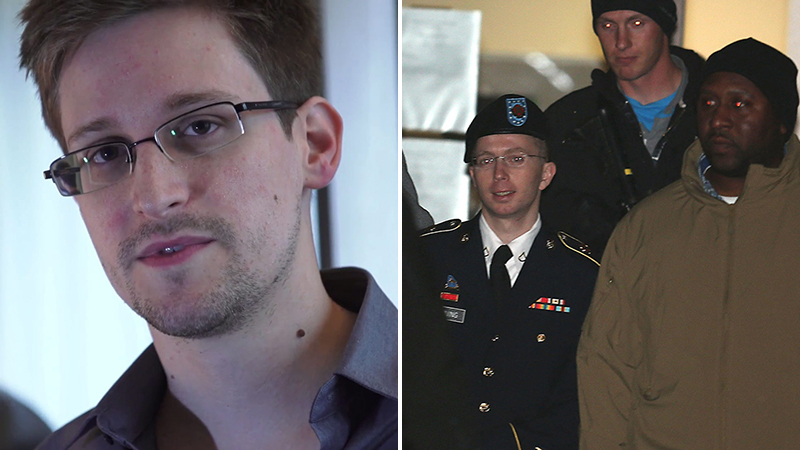Update on the Edward Snowden NSA Leak By Alexandra Zakreski In the weeks following Edward Snowden’s leaks of classified documents detailing widespread NSA surveillance (through the PRISM program), responses have varied across the political spectrum. As the trial of another whistleblower, Bradley Manning, nears its conclusion, its implications offer an opportunity to analyze recent developments in the NSA surveillance leaks. Both individuals were intelligence analysts who perceived that the U.S. government had gone too far in its goals of ensuring American security.
Bradley Manning was a U.S. army analyst deployed to Iraq between 2009-early 2010. After witnessing what he considered to be evidence of “war crimes and deceitful diplomacy,” he began passing classified documents including battlefield reports, diplomatic cables, and video footage to WikiLeaks. These materials amounted to approximately 700,000 classified documents, which were published starting in mid-2010. Manning was arrested in May 2010 and it has since been determined that his disclosures constituted the “biggest leak of classified information in the United States history.” Manning was charged with 22 counts, among them theft, computer fraud, espionage, and aiding the enemy.
On July 30, Manning was found not guilty of aiding the enemy, the most serious charge brought against him, but was convicted on charges of espionage, computer fraud, and theft. Debate has oscillated between views of Manning as a heroic whistleblower who lifted the veil on the breadth of civilian casualties in Iraq and Afghanistan, and views of Manning as a self-aggrandizing traitor who sought to be remembered for his ability to circumvent strict American security. Edward Snowden’s actions have elicited a similar diversity of opinion.
In the wake of Snowden’s revelations, some critics have accused the former NSA contractor of fabricating the extent of surveillance programs, others have branded Snowden a traitor, and many have expressed shock and outrage at what they consider to be a massive violation of civil liberties. Even senior officials like Senate Majority Whip Dick Durbin have voiced deep concern at the opaque procedures of the FISA court which authorized the surveillance programs. James Clapper, Director of National Intelligence, has been forced to backtrack on his previous testimony to Congress and admit that he lied under oath when he said that the NSA did not “wittingly” gather data on American citizens.
Congress recently voted on the Amash amendment to rein in NSA surveillance procedures. While the amendment was defeated, the results of the vote are very telling of the extent to which PRISM has struck a chord across party lines. The margin of defeat was narrow, consisting of only seven votes, as 55% of Democrats and 45% of Republicans rejected the administration’s public objection to the amendment and voted in favour of reform.
[captionpix align=”left” theme=”elegant” width=”320″ imgsrc=”http://natoassociation.ca/wp-content/uploads/2013/08/pew.png” captiontext=””]
In this climate of confusion, apparent dishonesty from the highest levels of the Obama administration, and unwillingness on the part of the President to address criticisms of the program, a significant shift in the American consciousness has taken place. A recent poll by Pew Research found that “47% [of Americans] say their greatest concern about government anti-terrorism policies is that they have gone too far in restricting the average person’s civil liberties, while 35% say they are more concerned that policies have not gone far enough to protect the country.” These findings mark the first time in nearly ten years that Americans are prioritizing civil liberties over protection from terrorist threats.
In the meantime, Snowden has tried to apply for asylum in several countries and until very recently was unsuccessful, with many observers accusing the U.S. government of bullying other nations into refusing Snowden diplomatic protection. Ironically, this has had the opposite effect of spurring several Latin American countries, Bolivia among them, into offering Snowden asylum in defiance of American pressures.
On August 1, Snowden was granted temporary asylum in Russia. There had been some doubt that claim would be accepted as Snowden had been unwilling to meet conditions set by President Vladimir Putin that he cease publishing classified documents. Putin has consistently asserted that he will not comply with American requests for Snowden’s extradition, and in light of fresh disclosures from Snowden, Russia’s actions will certainly strain diplomatic ties with the U.S. Snowden has, however, found an ally in Julian Assange, the founder of WikiLeaks who is currently holed up in the Embassy of Ecuador in London, awaiting his own opportunity to travel to Ecuador to escape American persecution.
Bradley Manning’s conviction sets an interesting precedent for how Snowden may be dealt with if he is captured and charged by American authorities. Snowden is currently facing charges under the Espionage Act, which dictates that it is illegal to disclose classified information “with intent or reason to believe that the information is to be used to the injury of the United States, or to the advantage of any foreign nation.” Manning faces a sentence of up to 136 years for his convictions and Snowden could face a similar length of time. For the time being, it seems that Snowden is safe from American criminal charges. However, the persecution that both he and Manning have faced will undoubtedly produce a chilling effect on other potential whistleblowers that might come forward with evidence of government violations of civil liberties or human rights.
Despite government hostility towards Snowden, it is important to note that according to at least one national poll, more Americans view Snowden as a whistleblower than as a traitor. As the issue has prompted passionate responses in the majority of Americans, it will be interesting to see how considerations of privacy and security are weighted for future U.S. government administrations, particularly for the next presidential election in 2016.




